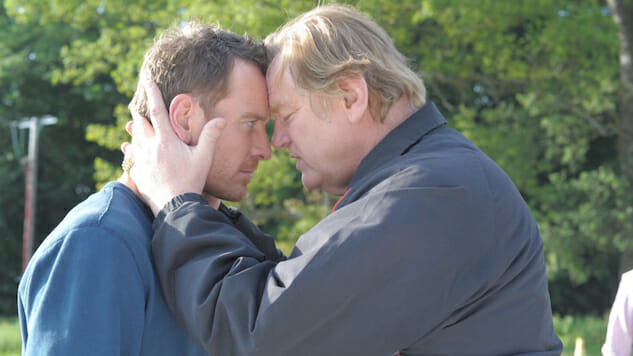
It’s fitting that a production company named Animal Kingdom is one of the forces behind Trespass Against Us, because Adam Smith’s new crime/family drama often reminds one of David Michôd’s 2010 film of the same name—if not strictly in its details, then in its general view of family ties as constricting-bordering-on-deadly. Thankfully, Smith’s film doesn’t have any heavy-handed animal metaphors to give its fairly mundane plot inflated importance—but, considering how stubbornly uninvolving Smith’s film is, despite the considerable acting talent involved, perhaps it could have used some.
Michael Fassbender and Brendan Gleeson are the stars of this one, and those who had the misfortune of sitting through the recent Assassin’s Creed may be amused to know that both actors play yet another troubled father-son duo. Their characters sound potentially interesting on paper, with Chad Cutler (Fassbender) the son of Colby (Gleeson), the patriarch of a whole family of thieving outlaws who live in trailers in the Irish countryside. Colby may not be as out-and-out cruel as Smurf, the scheming matriarch of the Cody clan in Animal Kingdom, but his “evil,” such as it is, is subtler. He’s so anti-establishment in his worldview that he’s cloistered his family away from normal society, taking his children—including Chad back when he was a teenager, thus his illiteracy as an adult—out of school, and teaching them lies like “the world is flat.” (Appropriately, the Cutler clan make a ritual out of launching slingshots at an effigy-like statue of a police officer, a symbol of their contempt for authority.) The drama of Trespass Against Us is born of the tension that develops between Chad and Colby as the son struggles to wiggle out from under his father’s domineering influence, hoping to ensure a better life for his wife (Lyndsey Marshal) and two children. Chad’s attempts to go straight are hardly helped by his foolish but inevitable decision to participate in the robbery of an important Lord-Lieutenant, which fuels the zeal of P.C. Lovage (Rory Kinnear), the cop who has been after the Cutlers for years.
All of this could have made for a pungent melodrama about the dark side of family devotion. But neither Smith nor first-time screenwriter Alastair Siddons ever answers the crucial question of why exactly we should care about any of these characters in the first place. We never get a sense of where Colby’s distrust of authorities comes from; for all we know, he’s just unthinkingly parroting what his own father taught him. As for Chad, we’re never allowed to actually see him decide to change his lot in life. Instead, right in one of the film’s opening scenes, Chad is already shown secretly trying to buy a house away from the Cutlers, making his realization something to accept from the outset rather than dramatize in an organically satisfying way. Such failures to fill in fairly simple points of backstory distance us from the characters. In turn, Smith seems to pretend he’s engaging in sociological observation rather than making a genre piece. But without fully fleshed-out characters worth observing in the first place, Trespass Against Us, for all the huffing and puffing of its actors, inspires little more than a giant shrug.
Director: Adam Smith
Writer: Alastair Siddons
Starring: Michael Fassbender, Brendan Gleeson, Lyndsey Marshal, Georgie Smith, Rory Kinnear, Killian Scott
Release Date: Jan. 20, 2017
Kenji Fujishima is a freelance film critic, contributing to Slant Magazine, Brooklyn Magazine, The Playlist, and the Village Voice in addition to Paste. He is also Deputy Editor of Movie Mezzanine and former editor-in-chief of In Review Online. When he’s not watching movies and writing and editing film criticism, he’s trying to absorb as much music, art and literature as possible. He has not infrequently been called a “culture vulture” for that reason.
GET PASTE RIGHT IN YOUR INBOX
The best music, movies, TV, books, comedy and more.